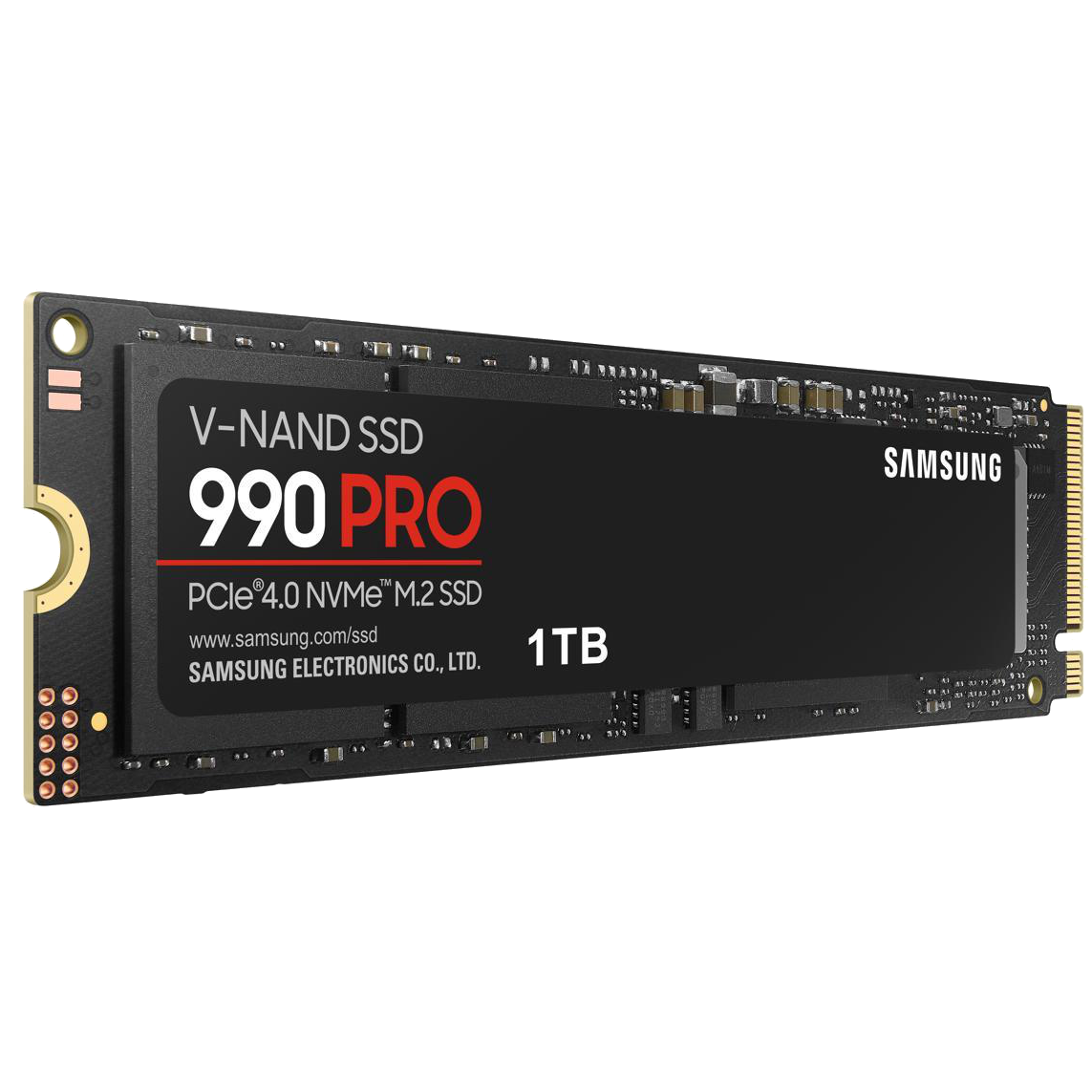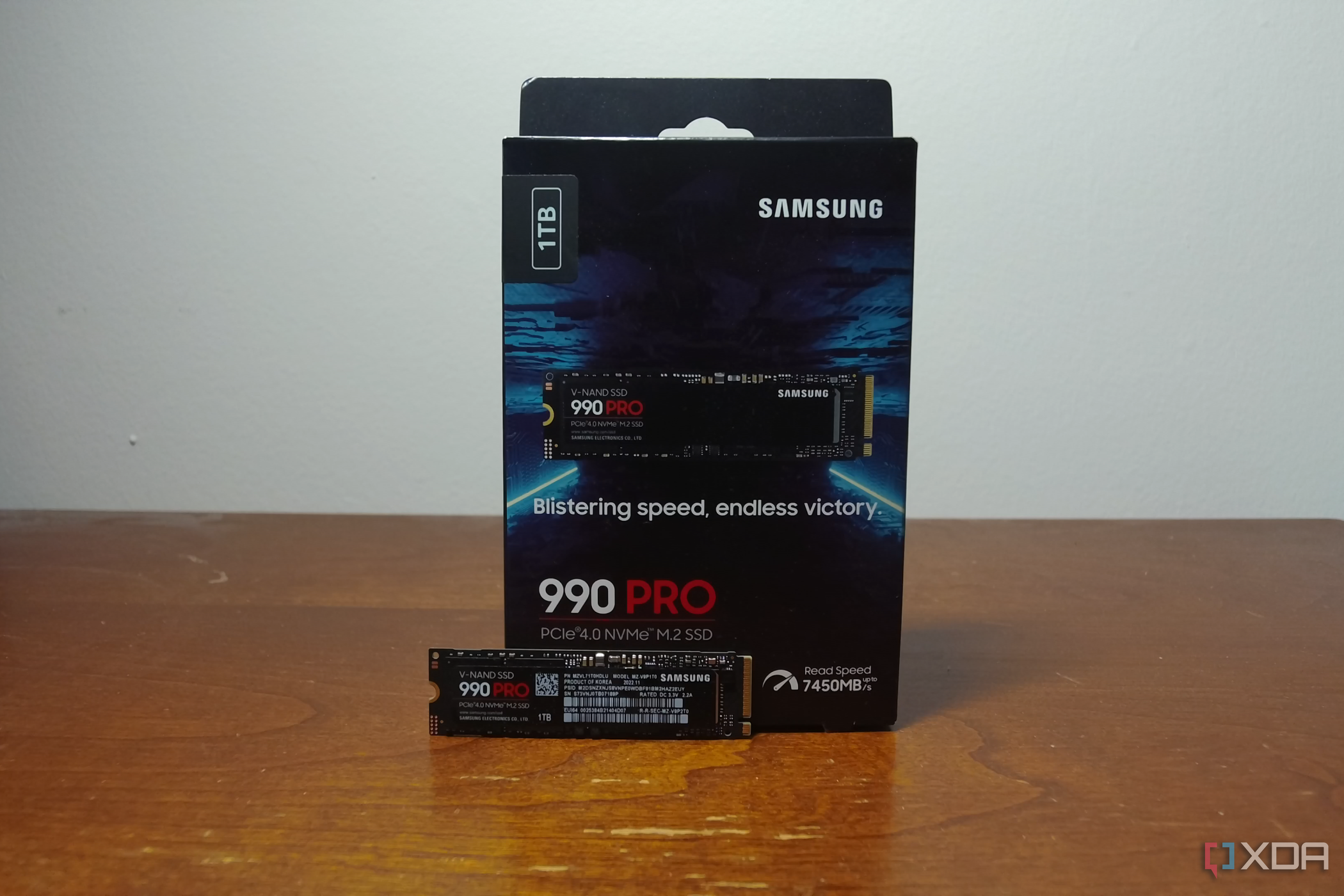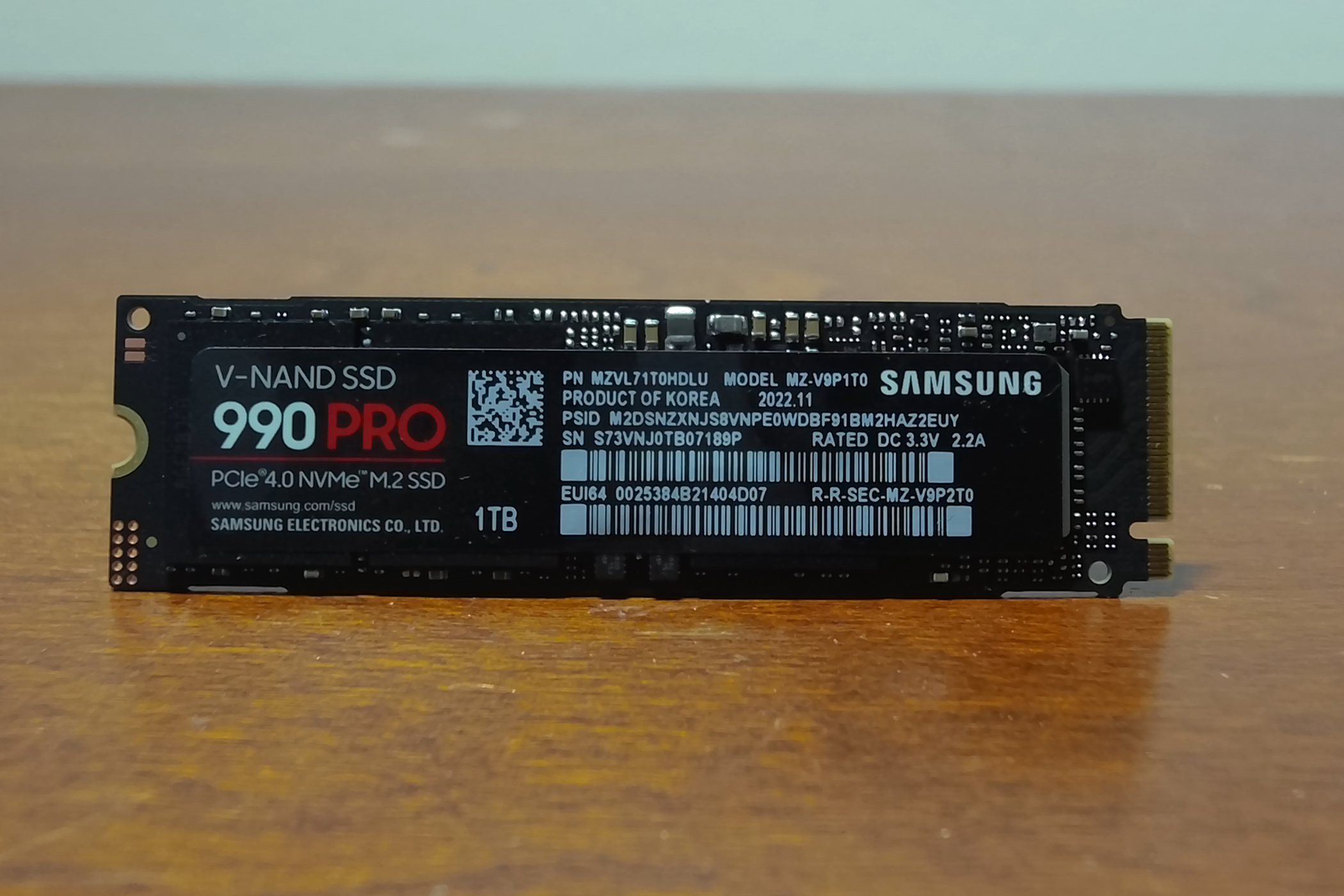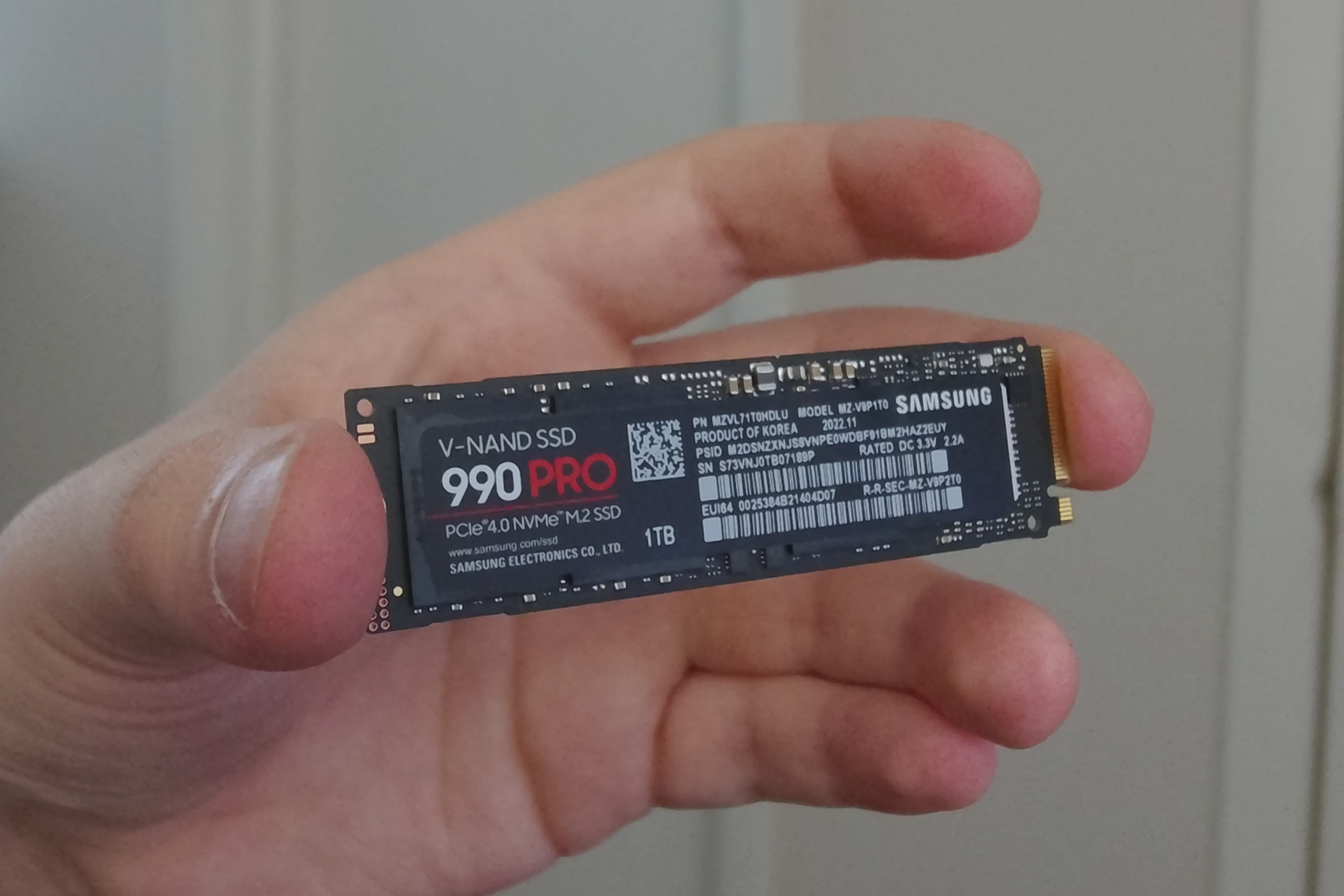Quick Links
The first PCIe 4.0-enabled SSDs (or Gen 4 drives) launched in 2019. Today, we're seeing the beginning of the PCIe 5.0 era, with the first consumer-grade Gen 5 drives about to hit store shelves. But that doesn't mean PCIe 4.0 SSDs are now paperweights. Lots of PCs don't support PCIe 5.0 drives, and even some brand-new devices only go up to PCIe 4.0. If you're limited to that older interface and you need the fastest drive possible, then Samsung's 990 Pro is your best bet.
Launching late last year, it's one of the last (perhaps the last) high-profile PCIe 4.0 SSDs that will come out, and it represents the best Samsung can do on this soon-to-be-retired interface. Coming in 1TB and 2TB sizes, the 990 Pro is marketed as the ultimate SSD for creators, gamers, and enthusiasts. In testing, it does indeed prove itself to be the ultimate performance Gen 4 SSD, but it's definitely overkill for most people. However, since it's so cheap, it's easy to recommend to anyone that has even a modest budget for storage.
About this review: The Samsung 990 Pro 1TB was purchased by XDA for this review. Samsung did not see the contents of this review before publishing.


Samsung 990 Pro SSD 1TB
Samsung's 990 Pro is truly pushing the limits of what PCIe 4.0 storage can offer. It offers the fastest transfer speeds we've seen so far for a Gen 4 drive while not costing much more than slower SSDs.
- Storage capacity
- 1TB
- Hardware Interface
- PCIe 4.0
- Brand
- Samsung
- Transfer rate
- 7,450/6,900 MB/s read/write
- TBW
- 600
- MTBF
- 1.5 million hours
- DRAM
- 1GB DDR4
- Price
- $100
- Controller
- Samsung
- Top-end performance for a PCIe 4.0 SSD
- Not much more expensive than other PCIe 4.0 drives
- Only 1TB and 2TB models available
- Old firmware can permanently damage the 990 Pro
Samsung 990 Pro pricing and availability
- 1TB model available at most retailers for around $120
- You can get a version with a custom heatsink only at Samsung's website
The 990 Pro is available at pretty much every retailer that carries SSDs, with the 1TB model going for $120 and the 2TB model going for $230 at the time of writing. There is a version with a custom heatsink, but it's only available at Samsung's website. While the extra cooling capacity can improve performance on one of these high-end SSDs, many motherboards already come with SSD heatsinks complete with thermal pads, so it's not clear that Samsung's heatsink (which costs extra) is particularly desirable.
How the 990 Pro was tested
- The test system had the latest hardware for the most accurate results
- The 990 Pro was tested in CrystalDiskMark 8 and ATTO Disk Benchmark
In order to get the most out of the 990 Pro, I tested it in a PC with a Ryzen 9 7900X, an Asus ROG Strix B650E-I Gaming, and 32GB of G.Skill Flare X5 Series (6000 MHz, CL36) RAM. The Strix B650E-I has an included heatsink for SSDs, which I used instead of the optional one with the 990 Pro. Many other higher-end motherboards come with their own heatsinks, but it's unlikely that our performance results would be impacted by its inclusion or not.
The competition for the 990 Pro is actually Samsung's best PCIe 3.0 SSD from 2019: the 970 EVO Plus 1TB. I'm not concerned with how the 990 Pro compares to other Gen 4 drives since there's plenty of data for that already. Instead, it would be more interesting to examine how far the PCIe 4.0 interface advanced storage performance since 2019. The 970 EVO Plus was tested in the same PC under the same conditions.
As for software, our operating system of choice was Windows 11 with the latest updates, drivers, and firmware applied and installed. I tested CrystalDiskMark 8 using both the default and NVMe profiles, as well as ATTO Disk Benchmark in its default configuration. Although these are synthetic benchmarks and not examples of real-world performance, the results here are repeatable.
The results: Excellent performance that hits the limit of PCIe 4.0
- The 990 Pro is roughly twice as fast as the 970 EVO Plus when handling large files
- When dealing with much smaller files and in software that doesn't make full use of the available resources, the 990 Pro is only slightly ahead of the 970 EVO Plus
CrystalDiskMark 8 was benchmarked using default parameters with differing queue depths, threads, and data sizes. The technical details aren't too important, what you need to know is that sequential files (denoted by SEQ) are big files that are simple to transfer, like a .zip with lots of stuff in it. Meanwhile, random files (denoted by RND) are smaller, sometimes even tiny files that individually aren't hard to process but can be challenging to an SSD if there's just a ton of them.
990 Pro | 970 EVO Plus | |
|---|---|---|
SEQ1M, Q8T1 | 7465/6897 | 3575/3059 |
SEQ1M, Q1T1 | 3878/6046 | 3029/2725 |
SEQ128K, Q32T1 | 7467/6891 | 3505/2724 |
RND4K, Q32T16 | 4919/2960 | 1864/1971 |
RND4K, Q32T1 | 785/533 | 774/610 |
RND4K, Q1T1 | 72/248 | 53/240 |
Scores are organized by read/write and are measured in MB/s.
In sequential workloads, the 990 Pro significantly outpaced the 970 EVO Plus in both reads and writes, but when the queue depth is low, you'll see a slight gap in reads. However, it's unlikely you'll run into many modern applications where SSD performance actually matters but the queue depth is only one or two. When transferring large files, the 990 Pro is almost twice as fast as the 970 EVO Plus.
It's a different story in random performance, with the 990 Pro only seeing a significant advantage when multiple threads come into play. With a limited thread count, even high queue depth random reads and writes are roughly even. It looks like Samsung already perfected or nearly perfected performance for these kinds of workloads a while ago.
The other benchmark we're looking at is ATTO Disk Benchmark, which is useful for demonstrating how quickly SSDs can transfer data when under size limitations. By default, both SSDs transferred data in increasingly larger chunks, starting with 512 bytes and ending at 64MB, but both drives hit their limit once they got to the 1MB mark.
990 Pro | 970 EVO Plus | |
|---|---|---|
512B | 75/53 | 76/63 |
1KB | 148/117 | 152/127 |
2KB | 296/242 | 301/250 |
4KB | 589/481 | 596/507 |
8KB | 1120/937 | 1110/991 |
16KB | 1620/1750 | 2450/2050 |
32KB | 3110/3200 | 2800/2870 |
64KB | 3480/5750 | 2950/2860 |
128KB | 3540/6390 | 3020/2870 |
256KB | 5580/6420 | 3080/2870 |
512KB | 6970/6390 | 3120/2860 |
1MB | 6950/6410 | 3300/2850 |
Scores are organized by read/write and are measured in MB/s.
ATTO shows similar results to CrystalDiskMark. The performance is relatively even with smaller files, but the gap changes at the 16KB mark, where the 970 EVO Plus surprisingly pulls ahead, but then falls behind at 32KB. From there the gap widens until the 990 Pro is performing at around twice the speed of the 970 EVO Plus. Overall, the 990 Pro is the faster SSD, but its lack of better performance when working on smaller chunks of data is notable.
Who should buy the 990 Pro?
You should buy if:
- You often transfer large files
- You want one of the best-performing PCIe 4.0 SSDs available
You shouldn't buy if:
- You're not transferring large files very often
- You're on a budget and need to prioritize a different component like the GPU or CPU
Samsung's 990 Pro is a great choice for people who know they're going to be encountering large files daily and need to access them or move them. Whether you're editing videos or photos and sending them off, putting together your own Plex media server, or just often finding yourself moving big files around, the 990 Pro is a good choice. It's not even priced like a professional piece of hardware, so it wouldn't be out of place in a PC for more casual activities.
That being said, there are cheaper SSDs, and what the 990 Pro is good at can be done by much less expensive and older drives. For instance, the 1TB model of the 970 EVO Plus, one of our favorite M.2 SSDs, excels in the kinds of tasks and operations that users encounter the most in regular usage. The 990 Pro's better sequential performance isn't really going to help in games, web browsing, and most productivity applications. Other PCIe 4.0 drives have most of the 990 Pro's sequential and random performance for $100 or less.
The only point against the 990 Pro, besides the lack of higher capacity models, is the firmware. Initial firmware versions had a crippling bug that caused drive health to deteriorate much quicker than normal, something that also happened on the 980 Pro. The latest version of Samsung's firmware (available via Samsung Magician) fixes this bug, but it does leave a sour taste in my mouth. If you're buying the 990 Pro you have to update the firmware ASAP.
Bottom line, if you're on a budget and you're shopping for a brand-new SSD, the 990 Pro is a good choice. Despite the fact that it's one of the most expensive SSDs available, $120 isn't that much for a single component; $120 for a high-end 1TB NVMe SSD would have been a steal a couple of years ago. If you can afford it, why not get it?

Samsung 990 Pro SSD 1TB
Samsung's 990 Pro is truly pushing the limits of what PCIe 4.0 storage can offer. It offers the fastest transfer speeds we've seen so far for a Gen 4 drive while not costing much more than slower SSDs.
- Storage capacity
- 1TB
- Hardware Interface
- PCIe 4.0
- Brand
- Samsung
- Transfer rate
- 7,450/6,900 MB/s read/write
- TBW
- 600
- MTBF
- 1.5 million hours
- DRAM
- 1GB DDR4
- Price
- $100
- Controller
- Samsung



